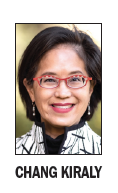
Editor’s note: The following is adapted from the comments Virginia Chang Kiraly made to the San Mateo County Board of Supervisors on Tuesday in the aftermath of the mass shootings in Half Moon Bay that left seven farm workers dead.
BY VIRGINIA CHANG KIRALY
I’m here speaking for myself and not as a member of the Harbor Board, but I am proud to represent the Coastside community as an elected member of that board. I’m also proud to be speaking as the Board President of the San Mateo County Chapter of the National Alliance on Mental Illness, also known as NAMI San Mateo County, and as the spokeswoman for the San Mateo Chapter of the Organization of Chinese Americans.
 I am a gun-violence survivor when my 8th grade English teacher was shot in the classroom more than 40 years ago in a school shooting that Austin, Texas forgot.
I am a gun-violence survivor when my 8th grade English teacher was shot in the classroom more than 40 years ago in a school shooting that Austin, Texas forgot.
Most importantly, I am the daughter of Chinese immigrants. You know me as Virginia Chang Kiraly. But, I am also Zhang Wan Li.
The horrific incident in Half Moon Bay has been a wake-up call for our community, shining a bright light on the lack of resources available to farmworkers, especially the surviving Chinese farmworkers.
Since the first night after the shooting, I have worked as a Mandarin translator for the Chinese farmworkers and also as their mental-health advocate.
I have visited the Chinese farmworkers almost every day since this tragedy, working with specially trained psychiatrists, who NAMI San Mateo County has partnered with, to provide culturally and linguistically appropriate counseling to them.
From my work over the last week, two concerns were raised for me.
Resource gap
The first was the big resource gap for the Chinese farmworkers. While this is being remedied by the County and the City of Half Moon Bay, it was obvious to me that no government agency or nonprofit was fully prepared to work with the surviving Chinese farmworkers, especially in the area of mental health, in a culturally appropriate way. More effective work is being done now with many amazing community groups stepping up to lend a helping hand, and I am heartened by this.
The second concern is one that will require patience and a long-term investment. That is the almost-complete lack of understanding and respect specifically for the Chinese culture and other Asian races where we are viewed as “white adjacent,” like the Japanese, Korean, and East Asian Indian cultures.
The saddest thing for me to see throughout this tragic ordeal is the unintentional ethnocentric behavior of those who mean well and want to help. This ethnocentric behavior, in my opinion, is similar to implicit bias, which results in the lack of representation — in this case, the lack of Chinese representation — whether it be at a vigil or an evacuation center or even the need for investing in crucial mental-health services.
Respect and tolerance
Given the call for respect and tolerance for all cultures, it follows that respect and tolerance must be given to all the Chinese people who are involved by considering appropriate protocols for recognizing the Chinese volunteers and memorializing the Chinese farmworkers.
The Chinese Exclusion Act may have been repealed decades ago, after 60 years of legalizing the exclusion of Chinese people, a specific class of people, from working and making a living.
However, societal behavior today, especially in California and even here in San Mateo County, has not changed, as I have seen over and over again during the time I have spent with the Chinese farmworkers since the day of the shootings. When speaking with the survivors, I have consistently heard that they are afraid to go back to subsistent living and working conditions.
I am afraid that without the necessary cultural understanding Chinese people should have, we, as a society, will regress to the dark days of the Chinese Exclusion Act without realizing it.
As we struggle to answer why the perpetrator did what he did, when he did not fit the typical profile of a mass shooter, I hope that more resources will be invested in mental-health support for Asians. With almost a third of San Mateo County being Asian, and growing, there is much work to be done to shatter the cultural taboo of Asians that asking for mental-health support is a sign of weakness or has a negative stigma to an individual or a family. If we work together to fund mental health services, especially for all Asians so that we can break our cultural taboo and the negative stigma of asking for mental health support, then these Chinese farmworkers will not have died in vain. We Chinese cannot and will not remain invisible.
Chang Kiraly, in addition to the positions she mentioned here, is also president of the Menlo Park Fire Protection District. She is a resident of West Menlo Park.

There is a negative stigma to mental health issues, or we are imposed upon to say there is.
We have been told to say there is for so long we participate willingly in repeating it.
Harold A Maio
I think this lady is right. I watched the news unfold and I was not aware there were also Chinese victims for several days. I’ve always been surprised there is not more Asian political representation in our region, why is that?